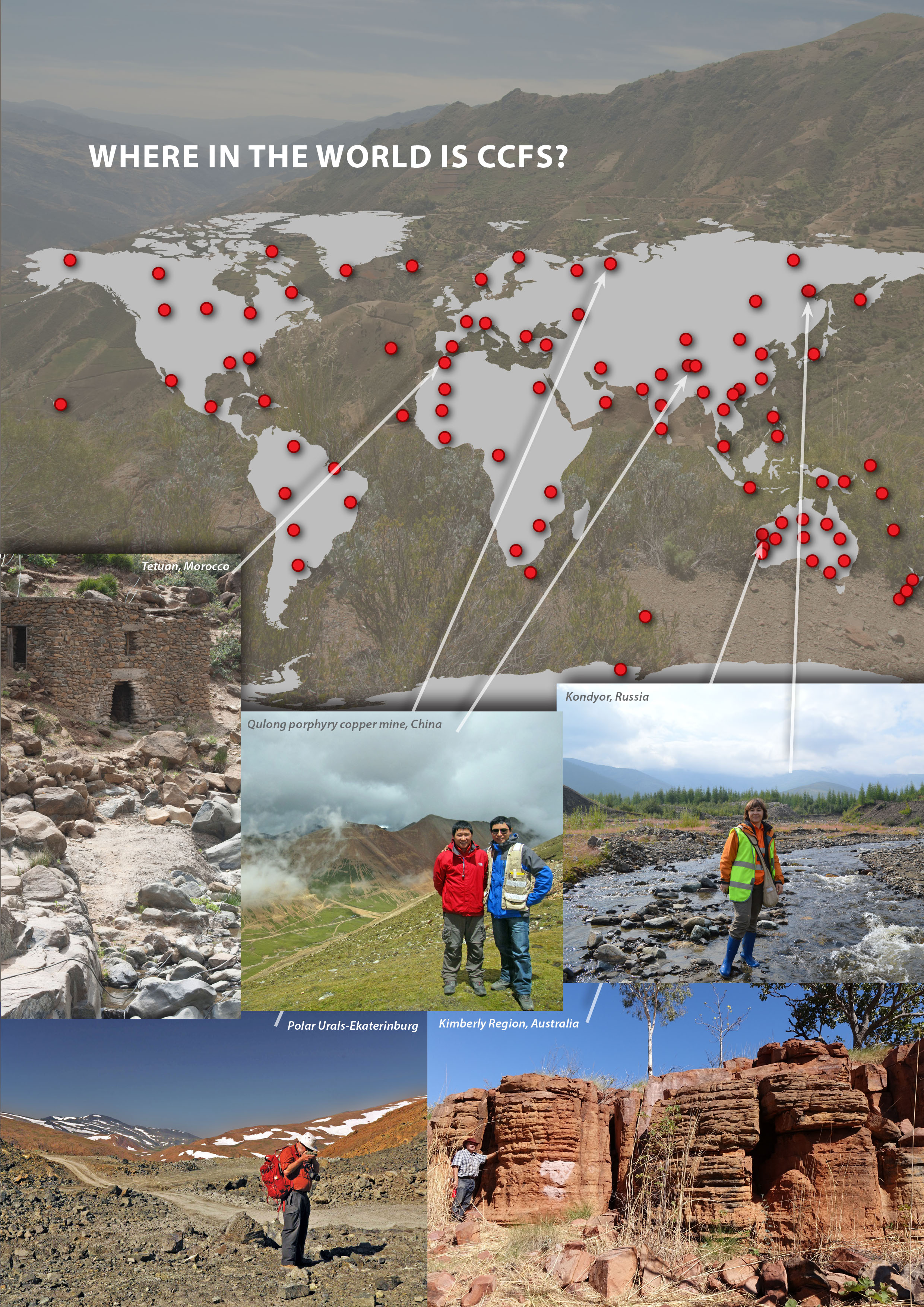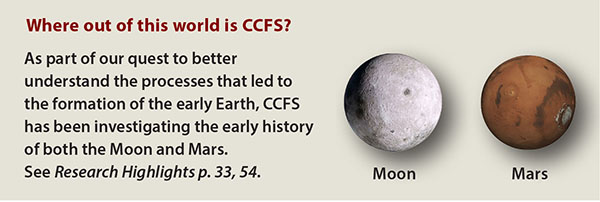The CCFS research program
The CCFS CoE builds on world-class infrastructure and world-leading research expertise and track record, and has already multiplied the capabilities of the Collaborating and Partner Institutions. The research program aims to enhance existing strengths in geology, geochemistry, geophysics, experimental petrology and petrophysical/dynamic modelling, and to integrate knowledge and datasets from these disparate fields
Major Research Objectives
|
These objectives are being addressed through the Research Projects described below.
The scope of the research, and thus of the Foundation Projects, is determined by the funding base allocated by ARC with strategic leverage planned to expand available resources.
FOUNDATION RESEARCH PROGRAMS
Foundation Programs for 2011-2014 were funded from the ARC Centre funds allocation, and include components from the Universities’ funding support. The first tranche of Foundation Programs was chosen from formal applications by CCFS participants based on presentations and discussions at a 2-day meeting in October 2010, ratified by the Executive Committee, and accepted on report to the Advisory Board. Foundation Programs are designed to be interdisciplinary, cross-node and to foster early-career/postgraduate researchers participation.
The research directions of the Foundation Programs were designed to contribute to the overarching three major Themes identified to bring about a new level of understanding of Earth and its resource dispersion. They include three integrated projects targeted at Technology Development required to deliver the research goals.
|
Summaries and progress are detailed in Appendix 1 |
Foundation Research Programs
| Program | Coordinator and main Centre personnel |
| 1. The TARDIS program: Tracking ancient residues distributed in the silicate Earth |
O’Reilly, Griffin, Pearson, Fiorentini, O’Neill, Afonso, Yang, Cliff, Martin, Kilburn, Belousova, González-Jiménez (ECSTAR, ECR), Satsukawa (ECSTAR, ECR), Huang (ECR), Locmelis (ECR) |
|
2a. Metal sources and transport mechanisms in the deep lithosphere |
Fiorentini, McCuaig, Barley, Rushmer, Griffin, Pearson, Evans, Reddy, Kilburn, Locmelis (ECR), Turner, O'Reilly |
|
2b. Dynamics of Earth’s mantle: assessing the relative roles of deformation and magmatism |
Reddy, Kaczmarek |
|
3. Generating and stabilising the earliest continental lithosphere - Late granite blooms
|
Griffin, O’Reilly, O’Neill, Pearson, Van Kranendonk, Belousova, Gréau (ECR) Murphy, Gao, Tretiakova (PhDs) |
|
4. Two-phase flow within Earth’s mantle: modelling, imaging and application to flat subduction settings |
O’Neill, Afonso, Yang, Li, Gorczyk |
|
5. Early evolution of the Earth system and the first life, from multiple sulfur isotopes |
Barley, Fiorentini, Kilburn, Wacey, Van Kranendonk, Wilde, Nemchin, Griffin Isaac (PhD), Djokic (MPhil) |
|
6. Detecting Earth’s rhythms: Australia’s Proterozoic record in a global context |
Li, Pisarevsky, Wingate, Wang, (ECR, ECSTAR) Huang, Zhu, Yao, Pang, Tao, L. Liu, Y. Liu, Meng (PhDs), Niu (MSc) |
|
7. Fluid regimes and the composition of the early Earth |
Wilde, Nemchin, Grange, Barley, Kusiak, Kaczmarek, Pidgeon |
|
8. Diamond Genesis: Fluids in deep-Earth processes |
Griffin, O’Reilly, Pearson, Cliff, Martin, Kilburn, Howell (ECR) Rubanova, Yao (PhDs) |
|
9. 4D lithospheric evolution and controls on mineral system distribution: The Western Superior-Yilgarn comparison |
McCuaig, Fiorentini, Kemp, Belousova, Cliff, Kirkland, Van Kranendonk, Lu (ECR, ECSTAR) Bjorkman, Parra-Avila, Stevenson, Iaccheri (PhDs) |
|
10a. 3D architecture of the western Yilgarn Craton |
Gessner, Van Kranendonk, Tyler, Belousova, Yang, Afonso, O’Neill, Gorczyk, Zhang (ECR) |
| 10b. Zircon Lu-Hf constraints on Precambrian crustal evolution in Western Australia |
Wingate, Belousova, Tyler |
Technology Development |
|
|
Cameca Ion microprobe development: maximising quality and efficiency of CCFS activities within UWA Ion Probe Facility |
Kilburn, Cliff, Griffin, Fiorentini, McCuaig, Barley, Pearson, Reddy, Martin, Huang (ECR), Howell (ECR) Gao, Xiong (PhDs) |
|
Frontiers in integrated laser-sampled trace-element and isotopic geoanalysis |
Pearson, Cliff, Griffin, O’Reilly, Kilburn, Huang (ECR), Gréau (ECR) Gao, Genske, McGowan, Xiong (PhDs) |
|
Optimising mineral processing procedures: From rock to micro-grains |
Pearson, Belousova, Daczko, wide spectrum of Centre researchers |
2014 Flagship Programs
| Program | Coordinator and main Centre personnel |
|
1. Deep Earth fluids in collision zones and cratonic roots (TARDIS II) Themes 1, 2, 3 Earth Fluids, Earth Architecture |
O’Reilly, Griffin, Pearson, Cliff, RA (TBA), Kilburn, Martin, Huang (ECR), Satsukawa (ECSTAR, ECR), Abily(ECSTAR, ECR), Gréau, Saunders (ECR’s) McGowan, Xiong, Xu, Tilhac, Colas, Lu, Liptai (PhDs) |
|
2. Genesis, transfer and focus of fluids and metals Themes 2 and 3 Earth Fluids |
Fiorentini, McCuaig, Foley, O’Reilly, Griffin, Reddy, Rushmer, Adam, Turner, Lu (ECR), Bagas, Gorczky, Piazolo, Kilburn, Clarke Thébaud, Guergouz, Bjorkman, Xu (PhDs) Arting, Burley, Johannesen (MSc) |
|
3. Modelling fluid and melt flow in mantle and crust Themes 2 and 3 Earth Fluids, Earth Architecture |
O’Neill, Afonso, Yang, Li, Foley, Clark, S. Zhang (ECR), Shan, Gorczky, Smith, O’Reilly, Griffin Wasilev, Ramzan, Oliviera, Grose, Jiang (PhDs) |
|
4. Atmospheric, environmental and biological evolution Theme 1 Earth Fluids, Earth Architecture
|
Van Kranendonk, Wacey, Fiorentini, Foley, McCuaig, Cliff, Kilburn, Grange, Kirkland, Alard Baumgartner (PhD), Djokic (MPhil) |
|
5. Australia’s Proterozoic record in a global context Themes 2 and 3 Earth Architecture |
Li, Pisarevsky, Wang, Yao (ECR), Wingate, O’Reilly, Griffin, Pearson, Belousova, McCuaig, Wang (ECR) Tao, l. Liu, Y. Liu (PhDs) |
|
6. Fluid regimes and composition of early Earth Themes 1 and 3 Earth Fluids, Earth Architecture |
Wilde, Nemchin, Grange, Martin, O’Neill Gu, Ge (PhD) |
|
7. Precambrian architecture and crustal evolution in WA Themes1,2 and 3 Earth Architecture |
Kirkland, Belousova, Gréau, Gessner, Yuan, Merdie, Wingate, Tyler (ECR) PhD/ECR 2015 (TBA) |
Technology Development |
|
|
Cameca Ion microprobe Themes 1, 2, 3 Earth Fluids, Earth Architecture |
Kilburn, Cliff, Martin, Fiorentini, McCuaig, Wacey, Wilde, Griffin Students of CIs and ECRs utilising the Ion Probe Facility are active in the program |
|
GAU multi-instrument development Themes 1, 2, 3 Earth Fluids, Earth Architecture |
Pearson, Griffin, O’Reilly, Cliff, RA (TBA), Kilburn, Martin, Huang (ECR), Saunders (ECR) McGowan, Gao, Xiong (PhDs) |


 ARC Centre of Excellence for Core to Crust Fluid Systems
ARC Centre of Excellence for Core to Crust Fluid Systems